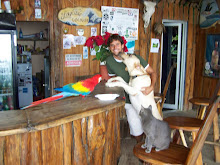
My mom and I had a great conversation the other night, during which I remembered a certain personality psychology course I took at Harvard. While I was pretty well known for not attending lectures, this particular course spoke to me. It was taught by an absolutely wonderful man named Brian Little, who was almost poetic in his lectures about "personal projects", "pseudo selves", and "having, doing, and being." It amazes me that I haven't thought of him within the last year or so, because as I look back, he might have been a very significant influence on my life.
Professor Little was not only fun. He was VERY fun. And he was also very interesting. Much of what he taught was his material (which is common at Harvard), and his particular perspective on personality psychology was not necessarily brand new, but was humanistic in a manner that is rare at a research institution like Harvard. Now, it has been years since I took the course, but one of the central concerns of Little is how personal projects, personal strivings, and life tasks lead us to generally take on different personality characteristics. In other words, it is theorized that our personality is relatively stable throughout our lives, but we actually show personality traits that are significantly different than our stable personality in order to accomplish certain goals. For example, I may be far on the introvert side of the Extroversion scale and far on the positive side of the Neurotic scale (there are five main "scales" that are commonly used in defining a personality), but I may have a life goal of being married and having children. God KNOWS no nice girl in her right mind would want to be with me being who I really am, and so I can only help to find a girl in her wrong mind or act a little different to fool those sane girls into loving me. Thus, I may act extroverted and less neurotic in order to attract a pretty girl who might find me interesting enough to bear my children and tie the knot.
What Little found, of course, is that high stress is highly correlated with a large separation between the personality of our short-term "pseudo-self" (although I think he hated this word) and our "actual" self. This shouldn't come as a surprise. In considering "sacrifice" though, I find this particularly interesting. I am of the opinion these days, and not even that strong of an opinion, that the only thing one can really sacrifice in this life is one's self. At any time that I am not being true to myself, that I am not being authentically me, I am sacrificing myself. A good friend once said that if, in any job, you are sacrificing yourself, you will find that no amount of compensation will ever make up for it. I tend to agree. And while I believe that changing one's personality is not necessarily out of line with being authentic, I believe it provides a nice metaphor. Perhaps the stress that we feel when we are using a false personality is a good metaphor for the suffering (as the Buddhists would call it) we feel when we are not being our authentic selves. Perhaps it's more than a metaphor. Perhaps is just a smaller scale of the same problem.
Before his final lecture at Harvard, Little had asked us to read what I remember as the 18th and final chapter of a book. I can't quite remember the name of the book, or what genre it would fit in, but it was just a short little thing, and I believe that the 18th and final chapter was perhaps titled "Save the Last Dance." In this chapter, the author writes in the first person, and is writing a request to himself. In this plea, he forgives himself for not always being there, from straying away from himself from time to time. He doesn't assign blame, but instead offers understanding, a compassion for himself for wandering away from his true self, knowing that it was in pursuit of important life goals. But he asks himself, in a lovingly poetic way, to come back home when those tasks are done. He asks himself, when he finally reaches his deathbed, to save that last dance for him.
So Dr. Little, in his final minutes of his final lecture at Harvard, brought the class to tears and then a 20 minute standing ovation as he left us with something that would not be on a test. It was not something that we would need if we went on to become psychologists or psychiatrists, but something he found important enough to share with that mass of inspired intellectuals. As we go through life, we will frequently seperate from our true selves. We will find ourselves acting, wearing masks, putting on shows in order to accomplish certain goals, whether life-long or short term. But in the end, peace comes from being at home, from being ourselves. That last dance should be for us, not for this human experience and its demands.
I guess for me, I'm interested in dancing with myself before that final song. Of course, when you first start dancing with someone new, it's sloppy. Sloppy is actually quite an understatement for what I am experiencing right now. I guess I would prefer to go through the awkwardness now, though. Perhaps then I can enjoy whatever song life plays, regardless of whether or not I have a partner. And when my time does come, perhaps I'll be a bit more graceful, or at least be able to just laugh with myself when I lose the beat.

No comments:
Post a Comment